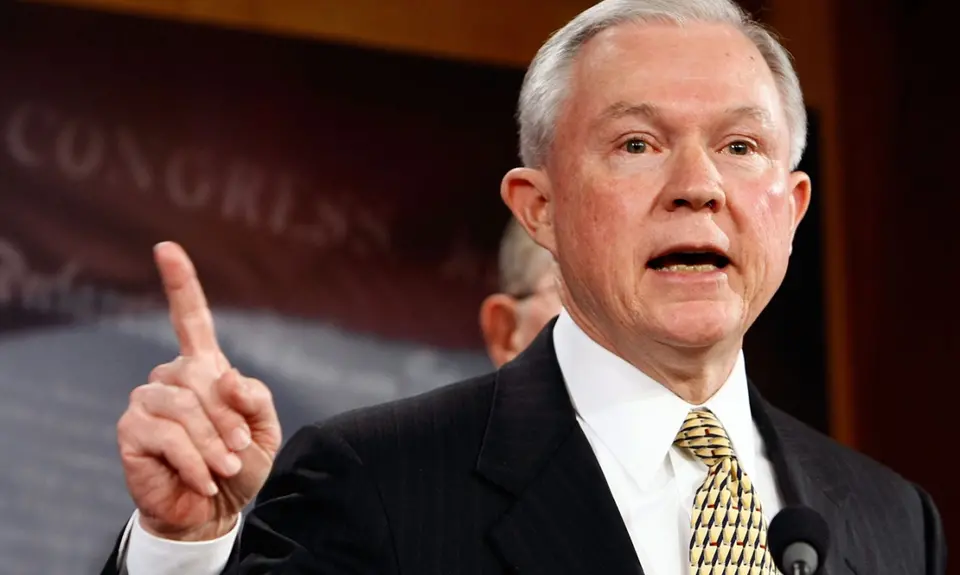As a close ally and early supporter of President-elect Donald Trump, Alabama Sen. Jeff Sessions has emerged as an early favorite to secure a spot in Trump’s cabinet, with recent speculation being that he will be nominated as attorney general.
Sessions’ record on race is so alarming that it’s not at all surprising to see him on Trump's team.
Sessions defended Trump’s proposed ban on Muslims from entering the U.S. and Trump has embraced many of Sessions' proposals, like “canceling federal funds to sanctuary cities,” slowing legal immigration and challenging the 14th Amendment’s guarantee of birthright citizenship. In January, a top aide to Sessions, Stephen Miller, joined the Trump campaign as senior policy adviser, and Sessions’ chief of staff Rick Dearborn is the executive director of Trump’s transition team.
Sessions’ record on race is so alarming that it’s not at all surprising to see him on Trump's team.
In 1986, a bipartisan majority of the Senate Judiciary Committee rejected his nomination to a federal judgeship in the midst of charges of racial bias. For example, Sessions had criticized civil rights groups as “un-American” and “Communist-inspired” and accused them of trying to “force civil rights down the throats of people.” He also dubbed a white civil rights attorney a “disgrace to his race,” according to a witness, and reportedly called a black lawyer in his office “boy.” In his confirmation hearing, he admitted to referring to the Voting Rights Act as “a piece of intrusive legislation,” and he later opposed efforts to update the landmark law.
As The New Republic chronicled, Sessions prosecuted civil rights activists for trying to register black voters while saying that he only disapproved of the Ku Klux Klan after he “found out some of them were ‘pot smokers,’” a remark he later insisted was just a joke.
Sessions was U.S. Attorney for the Southern District of Alabama. The year before his nomination to federal court, he had unsuccessfully prosecuted three civil rights workers--including Albert Turner, a former aide to Martin Luther King Jr.--on a tenuous case of voter fraud. The three had been working in the "Black Belt" counties of Alabama, which, after years of voting white, had begun to swing toward black candidates as voter registration drives brought in more black voters. Sessions's focus on these counties to the exclusion of others caused an uproar among civil rights leaders, especially after hours of interrogating black absentee voters produced only 14 allegedly tampered ballots out of more than 1.7 million cast in the state in the 1984 election. The activists, known as the Marion Three, were acquitted in four hours and became a cause célèbre. Civil rights groups charged that Sessions had been looking for voter fraud in the black community and overlooking the same violations among whites, at least partly to help reelect his friend Senator Denton.
On its own, the case might not have been enough to stain Sessions with the taint of racism, but there was more. Senate Democrats tracked down a career Justice Department employee named J. Gerald Hebert, who testified, albeit reluctantly, that in a conversation between the two men Sessions had labeled the National Association for the Advancement of Colored People (NAACP) and the American Civil Liberties Union (ACLU) "un-American" and "Communist-inspired." Hebert said Sessions had claimed these groups "forced civil rights down the throats of people." In his confirmation hearings, Sessions sealed his own fate by saying such groups could be construed as "un-American" when "they involve themselves in promoting un-American positions" in foreign policy. Hebert testified that the young lawyer tended to "pop off" on such topics regularly, noting that Sessions had called a white civil rights lawyer a "disgrace to his race" for litigating voting rights cases. Sessions acknowledged making many of the statements attributed to him but claimed that most of the time he had been joking, saying he was sometimes "loose with [his] tongue." He further admitted to calling the Voting Rights Act of 1965 a "piece of intrusive legislation," a phrase he stood behind even in his confirmation hearings.
It got worse. Another damaging witness--a black former assistant U.S. Attorney in Alabama named Thomas Figures--testified that, during a 1981 murder investigation involving the Ku Klux Klan, Sessions was heard by several colleagues commenting that he "used to think they [the Klan] were OK" until he found out some of them were "pot smokers." Sessions claimed the comment was clearly said in jest. Figures didn't see it that way. Sessions, he said, had called him "boy" and, after overhearing him chastise a secretary, warned him to "be careful what you say to white folks." Figures echoed Hebert's claims, saying he too had heard Sessions call various civil rights organizations, including the National Council of Churches and the Southern Christian Leadership Conference, "un-American." Sessions denied the accusations but again admitted to frequently joking in an off-color sort of way. In his defense, he said he was not a racist, pointing out that his children went to integrated schools and that he had shared a hotel room with a black attorney several times.






